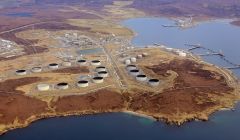Letters / ‘The time is ripe to protect Shetland’s present and future interests’ – open letter to councillors and any other interested parties
In recent times much has been written and reported in the local press about very many important matters of concern to Shetlanders: fishing, hydrogen, electricity, housing, poverty, infrastructure, on and offshore wind farms, fixed links, piers and harbours, hospitals, internal and external ferries, freight transport links, and planning to name but some.
The theme running through them all is concern and dissatisfaction about the current situation, and fear of what the future may bring.
Indeed, this has been manifested by the councillors’ recent vote of 18 to two seeking to question the political and economic/financial situation of the islands. Many islanders including fishermen realise that they could lose control of their environment and possibly their livelihoods.
Add to the mix the prospect that the Scottish Government via its ScotWind quango proposes to seek bids in early January to lease out areas around Shetland upon which successful applicants will seek to build wind farms.
This will complicate the situation further since it pertains to only one of the concerns mentioned above and does not address Shetlanders’ much wider concerns, as it does indeed impinge upon them. A more fundamental in depth and far-reaching attempt should now be made to properly address these issues.
However the above raises a more fundamental issue: does the Scottish Government have the legal authority to issue any licences at all?
In all UK waters only the UK parliament has issued licences for oil, gas and other explorations, and I would submit that licensing for wind farms areas comes under the same jurisdiction i.e. from the UK Government, and that the Scottish Government has no legal authority to try and circumvent that.
Indeed Scotland’s first minister has by a recent statement confirmed that, by saying that Scotland cannot legally shut down the Cambo oil field as it is a UK matter.
Similarly if Scotland has no authority to shut down an oil field it has none to drill for one. The logic of that is that the Scottish Government has no legal authority to permit the establishment of wind farms or shut them down, and is therefore breaking UK law by trying to do so.
Therefore the Scottish Government does not have the authority to grant licences and therefore cannot ask for bids for these offshore areas. The UK Government should now assert its authority in the matter.
In 1973 MP Mr Jo Grimond with support from Mr Ian Clark and the council’s Mr G W Blance (who took over the very good preparatory work done by Mr Eddie Thomason and other councillors) presented Shetland’s case to the UK Parliament in regard to oil developments and secured the passage of the Zetland County Council Act 1974.
It conferred upon Shetland several specific and unique rights which are not available to other Scottish (or English for that matter) councils, namely:
- compulsory purchase powers;
- created the SIC harbour authority;
- granted financial powers to borrow.
Item 1 was used to purchase the land upon which the Sullom Voe Terminal was built; item 2 established the Shetland harbour limits out to the then customary three mile limit. That limit was later extended to 12miles by an Act of the UK Parliament which applies to all UK waters. Within these waters the SIC was given the authority to issue (or deny) a works licence. Item 3 was used to fund various items such as navigational matters, tug boats, payment of wages etc.
From the above it surely follows that the Scottish Government, or its subsidiaries, should have to apply to the SIC for a works licence if they or anyone else who may be ‘granted’ an offshore leasing area upon which to build turbines, do so before any work can commence, proceed or continue.
If such a licence be granted by the SIC it should continue to be monitored to confirm compliance with its conditions. This of course would include wind farm structures and associated power lines to any shore-based terminal that comes within the authorised authority of the SIC, as granted solely to Shetland and its people by the UK Act of Parliament.
It should also include inter alia the turbines’ anchor lines for both the fixed leg or floating structure types. Naturally if any developments should take place outside of the 12-mile limit, they should also be subject to the same works licence conditions as those within the 12-mile area because all their power lines would have to cross the 12-mile line area to get to the Shetland terminal, notwithstanding the possibility that they could be joined up to the lines already in place. This is most important as any development on the seabed, subsea or upwards, and on the surface will greatly affect the grounds of the fishing areas, and the economy of Shetland.
As an example, one of the several proposals envisages 200 turbines located 100 kilometres (60 miles) off the west coast in a good fishing area. Similar proposals are envisaged to the east and north.
Should any of the proposals envisage delivery of power not to Shetland but to oil or gas fields outwith it, the same work licences should also apply through the IK Government to be consistent with those applicable to deliveries to Shetland.
If the Scottish (or British) governments or a lessee in an offshore area attempts to circumvent the SIC in these matters governed by the 1974 Zetland Act, they would of course be guilty of falling foul of an Act of the UK Parliament, and the latter is of course in charge of UK energy policy as energy is not a matter devolved to Holyrood.
Now to the wider issue: All the above matters would be more properly addressed if the UK Government would kindly amend the 1974 Zetland County Council Act to grant greater legal authority to the SIC over many more of the items listed at the beginning of this letter.
This might be accomplished more quickly by executing an Order in Council. This could also include a large measure of local control over fishing areas and quotas to take effect when the UK is released from the restrictions of the EU fishing deal ending in 2026.
Complete removal or at least a substantial delegation of planning from the brief of Scottish Ministers’ direct to the SIC to ensure proper local control and ensure that the SIC and its officers and officials are not proven to be impotent in many planning matters.
At the moment, the SIC has little room for manoeuvre in any planning appeal without incurring very heavy costs and is at a serious disadvantage against very large corporations having equally deep pockets. At the very least a level playing field is required.
We are entering the hydrogen age with numerous H2 projects (some with ammonia production attached) throughout the world before us, indeed several large gas carriers are being built in Japan to use ammonia as fuel in their main engines (ammonia does not emit any carbon dioxide when burned).
Shetland is in a unique geographic position to take advantage of that and grasp the golden opportunities being presented to build a prosperous society within the islands.
However due recognition has to be taken by all stakeholders to protect Shetland’s present industries such as fishing which has greatly helped Shetlanders in the past, together with its historic Nordic links and be guided accordingly.
Since there will now be a great deal of money circulating around wind farms, hydrogen, refineries etc, the SIC and the Scottish Government should at long last have the time and finance to immediately address the issue of fixed links to Whalsay, Yell, Unst and Bressay (Fetlar?) which has been an outstanding issue for at least 60 years, together with the replacement of the Fair Isle ferry and the others to the smaller islands of Skerries, Foula and Papa when required, otherwise an appeal direct to the UK Government might result in more action and success.
In light of all the above surely the time is ripe for the MP, MSP and SIC to investigate and attend to these matters to ensure and protect the present and future interests of Shetland, its inhabitants and their rights under the UK Zetland County Council Act 1974.
Cecil Robertson
Inverness












































































